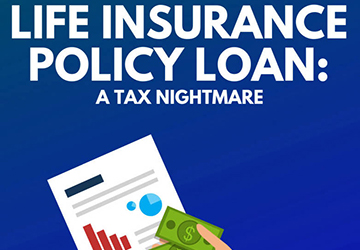The Impact of Policy Loans on Life Insurance Payouts
Life insurance policies often come with a hidden treasure: the ability to borrow against them. Many policyholders overlook this perk, but it can be a financial lifesaver in tough times.
Life insurance policies often come with a hidden treasure: the ability to borrow against them. Many policyholders overlook this perk, but it can be a financial lifesaver in tough times.
Think about it. You've been paying premiums for years, building up cash value. Now, you can tap into that money without jumping through hoops. No credit checks, no explanations needed. Sounds tempting.

But hold on. Before you rush to take out a policy loan, there's something crucial to consider. How might this decision impact the payout your loved ones receive when you're gone?
It's a question worth pondering. After all, you took out life insurance to provide for your family. You wouldn't want to shortchange them unknowingly, would you?
Stick around. We're about to dive into the nitty-gritty of policy loans and their ripple effects on insurance payouts. Trust me, you will want to take advantage of this.
Understanding Policy Loans
Have you ever wondered how to tap into your life insurance policy's cash value without cancelling it? Enter policy loans. They're a nifty feature that lets you borrow against your policy's value.
Here's the gist: You ask your insurer for a loan, using your policy as collateral. They hand over the cash, often with minimal paperwork and attractive interest rates. You do not need to explain why you need the money or undergo credit checks.
The best part? You're essentially borrowing from yourself. You can repay the loan on your schedule or not at all. The insurance company isn't hounding you for payments.
It sounds too good to be true. Well, there's more to the story. While policy loans offer flexibility and ease, they're not without consequences. But we'll get to that in a bit.
How Policy Loans Affect Life Insurance Payouts
Policy loans might seem like a sweet deal, but they can leave a sour taste in your insurance payout. Here's the lowdown on how these loans can shake things up.
First off, policy loans chip away at your death benefit. It's like taking a bite out of the pie before serving it. The more you borrow, the smaller the slice your beneficiaries get.
Then there's the interest. It's not just sitting pretty - it's growing. If you don't pay it back, it gets tacked onto your loan balance. Before you know it, your loan could be more significant than you bargained for.
And here's a kicker: some policies require loan repayment upon death. If there's not enough cash value to cover it, guess what? Your death benefit shrinks even more to make up the difference.
It's not all doom and gloom, though. With careful planning, you can minimize these impacts. But it's crucial to understand the trade-offs before you sign on that dotted line.
Common Scenarios Involving Policy Loans
Let's paint some real-world pictures. Policy loans aren't just abstract concepts - they're financial tools people use daily. Here's a look at everyday situations where folks might tap into their life insurance policies.
Borrowing for Emergency Expenses
Life's full of surprises. Not all of them are pleasant. Your roof springs a leak. Your car breaks down. Or worse, you're hit with unexpected medical bills.
This is where policy loans can be a lifesaver. They offer quick cash without the hassle of traditional loans—no credit checks. No explanations are needed—just money when you need it most.
But here's the rub:
● You're reducing your policy's value
● Interest keeps ticking, even if you're not paying
● Your safety net for loved ones shrinks
It's a trade-off. Immediate relief vs. long-term security. Worth it? That depends on your situation.
Using Loans for Investment Opportunities
Have you spotted a golden investment opportunity, but your piggy bank came up short? Some folks turn to policy loans to jump on these chances. It's tempting, right?
Picture this: You borrow against your policy at 5% interest. Then, you invest in a hot stock that returns 15%. Sounds like a win-win.
But hold your horses. Here's what you need to ponder:
● What if the investment flops?
● Can you repay the loan quickly?
● How will this affect your policy's long-term value?
Remember, you're gambling with your family's future security. It's a high-stakes game. Play wisely.
Covering Education Costs
College isn't cheap—that's no secret. Some parents use their life insurance policies as a piggy bank for tuition fees. It's an option, sure, but it comes with homework.

Consider this scenario:
● You take out a $50,000 policy loan for your kid's college
● Interest accrues over the years
● Your policy's value drops
● Your child graduates, but your death benefit shrinks
Is it worth it? Maybe. But have you explored other options? Scholarships? Federal loans? Work-study programs? Don't make policy loans your first stop on the education funding train.
Supplementing Retirement Income
Are golden years not so golden? Some retirees turn to policy loans to pad their nest eggs. It's like giving yourself an advance on your own money. Sounds brilliant.
But here's the deal:
● You're borrowing from your death benefit
● Interest keeps piling up
● Your legacy to loved ones shrinks
It's a balancing act—today's comfort vs. tomorrow's security. Before you dive in, chat with a financial advisor. They might spot options you've overlooked.
Remember, policy loans are tools. Like any tool, they can build or break. Use them wisely, and always keep an eye on the big picture.
Steps to Take Before Borrowing Against Your Policy
Are you considering taking out a policy loan? Hold your horses. Here's a quick checklist to run through first:
1. Crunch the numbers. Calculate how much you need. Don't borrow more than necessary.
2. Read the fine print, understand your policy's loan terms, and know your interest rates and repayment schedules.
3. Chat with a pro. A financial advisor can spot pitfalls you might miss.
4. Consider alternatives. Are you exhausted from all other options? Make sure this is your best bet.
5. Think long-term. How will this impact your policy's value? Your beneficiaries' payout?
6. Plan your repayment. Can you afford to pay it back? How quickly?
7. Inform your beneficiaries. They should know if their future payout might change.
Remember, a policy loan isn't free money. It's a severe financial move. Treat it that way. Your future self (and your loved ones) will thank you.
Consider the Long-Term Impact Before Borrowing
We've covered a lot of ground, haven't we? Policy loans can be a lifeline, but they come with risks. Before diving in, step back and look at the big picture.
Is this loan your best option? Have you weighed all the pros and cons? Remember, you're not just borrowing money - you're potentially reshaping your family's financial future.
Don't rush. Talk to a financial advisor. Crunch the numbers. And most importantly, think long-term. Your policy is more than just a piggy bank - it's a safety net for your loved ones.
Make an informed choice. Your future self will thank you for it.